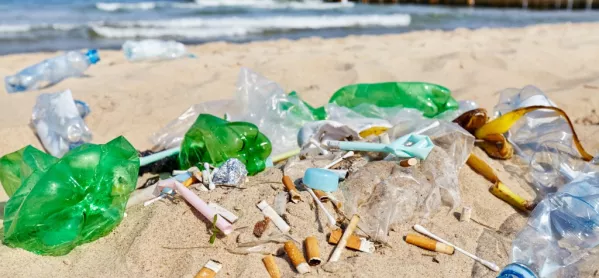From Bournemouth to Glasgow, and from Liverpool to Great Yarmouth, the easing of lockdown restrictions has seemingly been celebrated by mass littering.
Tonnes of rubbish pictures; tonnes of rubbish headlines.
What is clear from a collective response to this pandemic is that littering is endemic among a significant proportion of our population.
An issue with no solution
What are the implications of this for educators and legislators of the past 10 years, and the next? Clearly, whatever we have been doing on the issue has not worked.
Hundreds of thousands - possibly millions - of people are willing to treat their country and its environment carelessly, or with utter disdain.
No doubt images of our beaches and beauty spots wrought by the detritus of consumption will make their way into assemblies and lessons when schools return to some semblance of normality.
But there are not enough hours in the timetabled week for time to be dedicated to debris. We are still embedding recently overhauled curriculums from early years to post-16, grappling with amendments to every assessment from earliest Sats to A levels.
Then there’s the legal duty to cover content instilling British values, deliver relationships and sex education and ensure pupils exercise.
There will be reviews in response to the Black Lives Matter movement and to wellbeing in the light of lockdown and the coronavirus. There are calls for revision of accreditation in 2021, and we need to be ready to adapt.
Where do we find time for educating on keeping Britain tidy?
A job for society to fix
But to be honest, people who left an estimated 40 tonnes of rubbish on Bournemouth Beach, 11 tonnes on Sussex shorelines and mountains of mess around the entire country are - for the most part - beyond education.
They are adults, young and old; families, parenting children. The issue cannot, therefore, be tackled in schools.
It perhaps requires legislation, taxation, punitive intervention - something that will get people to think twice before leaving their own waste behind.
But there appears to be little appetite for governmental intervention.
George Eustice, secretary of state for environment, food and rural affairs, spoke on BBC Breakfast with presenter Naga Munchetty. Unusual numbers of visitors to beaches were, he said, owing to unusually hot weather: “concerning”, but “short lived”.
No condemnation was made of people’s actions in terms of social distancing or behaviour; no indication or acknowledgement of a need for change was made.
A national campaign is needed
Maybe, then, what we need is a proper national education initiative.
A return to a public health and information campaign. Many teachers of today will have ingrained in their memories slogans from childhood: “Stop, look, listen and think”; “Clunk, click, every trip”; “Charley says…” They clearly have an impact.
And the timing is right to do so.
Coronavirus has, after all, heralded the return of governmental campaigns and films - informing the public of the need to “stay home”, to promote handwashing and hand hygiene and that, in an echo of a predecessor, coughs and sneezes spread diseases.
Maybe we can look forward to a new campaign with an old message: “Keep Britain tidy”. Or the updated version adopted by City of York Council last week: “Don’t be a tosser”.
If nothing else, surely leaving our rubbish lying around, covered in bacteria, is hardly a good way to stop a disease spreading? Pitch the idea that way and it could do wonders for the beauty of our country.
Sadly, though, for all the initiatives, be they aimed at adults or children, it seems a large number of people in Britain seem to think littering is acceptable.
As such, those of us sensitive to this issue may want to avert our eyes from news and social media: pubs reopened today.
Deborah Hollingsworth is a secondary school teacher in East London. She tweets @debs_cares




